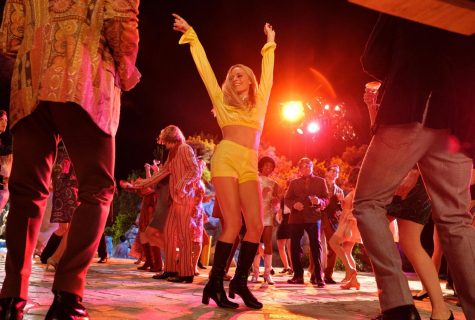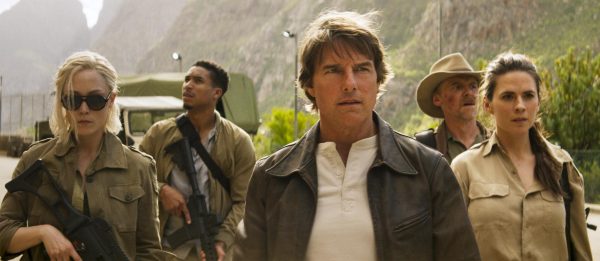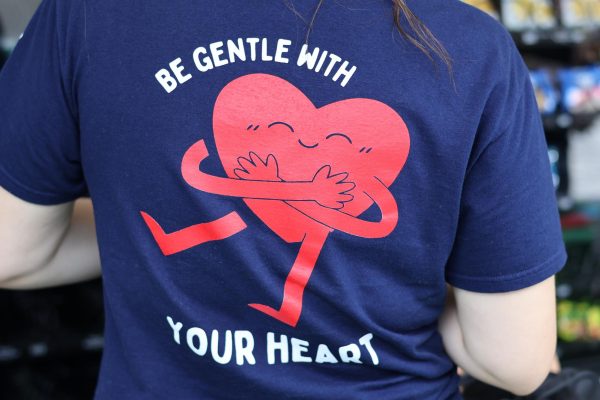The Truth about Once Upon a Time in Hollywood
August 22, 2019

It’s somewhat safe to say that if you have a pulse and know that movies exist you’ve at least heard of the name Quentin Tarantino. If not, you’ve most likely seen a handful amount of high school girls dressed up in black wigs and white button downs with fake blood trickled down their noses. You can thank Mr. Tarantino for that. You can also thank him for his new movie “Once Upon A Time In Hollywood.” Well, thank or maybe not thank depending on what you think of it, considering it has a load of mixed reviews.
Some tend to think that the movie just has to do with Charles Manson. It doesn’t. “Once Upon A Time In Hollywood” focuses on Rick Dalton (Leonardo Dicaprio) and Cliff Booth (Brad Pitt)– an actor and his stunt double– as they make their way through the ever changing film industry in 1969 Los Angeles. What was so changing about the industry? At the time, certain TV actors were successfully transitioning into movies, such as Steve Mcqueen, while other TV actors weren’t so successful and slowly became has-beens. Rick– being a TV actor trying to transition into movies– is a bit worried he might become one of the has-beens. While Rick struggles in securing his film career, living just next door to him is Roman Polanski– a master of film and one of the most prominent directors in the world. And who does Polanski live there with? His beautiful actress wife Sharon Tate– a loving, free spirited icon of Hollywood. The movie weaves in and out between Rick and Cliff, Sharon Tate, and the devilish hippies that made up the infamous Manson family.
It’s pretty clear by now that Tarantino enjoys touching on different historical events/time periods and twisting them around to his own liking (eg., “Django Unchained” and “Inglourious Basterds”). He does likewise with “Once Upon A Time In Hollywood.” The difference is in the story and the way Tarantino goes about telling it.
Having only a crisp nine movies to his name, Tarantino always tries to assure that his films offer a true experience. Although aspects of “Once Upon A Time In Hollywood” are very entertaining (especially the ending), the film lacks the truly riveting storytelling Tarantino usually brings to the table. The story didn’t feel like it was given its full potential. Missed opportunities are apparent; opportunities that are replaced with somewhat needlessly long scenes.
At two hours and forty-five minutes, it is indeed a long movie. Weirdly enough though, given the ‘day in the life’ angle it takes on as well as the long scenes that make it up, it sort of feels like not too much really happens. There’s this sense of everybody just waiting to see what happens at the end. When it comes down to it, that’s the promise that this movie offers: ‘Stick with me because the ending is what you’re gonna wanna see.’ The ending really is something you’re going to want to see too. It’s nuts. But just banking off of that isn’t exactly enough.
The film has been described as a ‘love letter to 1969 Los Angeles and the whole world of movies at that time.’ Although okay to include of course, the film gets a tiny bit carried away with nostalgia in particular areas. Tarntino has a way of making it enjoyable though, like a collective reminiscence.
Speaking of 1969 Los Angeles nostalgia, Tarantino actually recreated that time period in full. No CGI. Sony Pictures gave him a $90 million budget to make the thing and Tarantino put that money to good use. What you see on screen is really there and the detail that went into making that happen is remarkable and should be acknowledged as well as appreciated.
Quentin Tarantino is in the movie-making business for the true craftsmanship of movie making. He is one of the few existing filmmakers nowadays who still shoots his films on actual film. No digital. That’s the difference. He makes films, not hard drives.
When it comes down to it, “Once Upon A Time In Hollywood” does feel to be everything Tarantino wanted it to be. It feels personal. It feels true. It feels to be the movie he intended on making. Yes, certain parts can be criticized or could have maybe been a little different, but then it wouldn’t have been Tarantino’s. It is how it is because it is his. And it’s fun.











